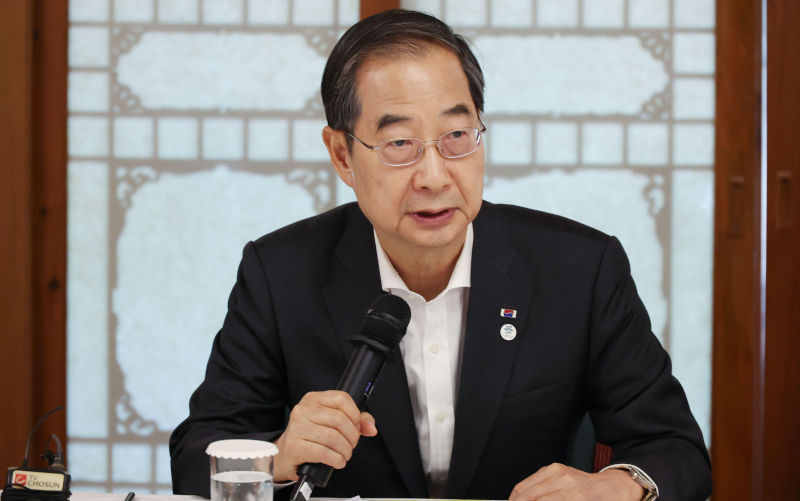The return of the zombie in South Korea
March 27, 2025
Han Duck-soo, the impeached South Korean Prime minister (and former acting president), has just had his impeachment reversed, and is now acting president again.
The constitutional court found that Han had violated the constitution (by refusing to appoint already approved justices to the Constitutional Court to rule on the impeachment issue) but they reinstated him anyway. Never mind the irony that the court could have lacked standing to try his case if he had been successful in disabling the court. Han had also been tasked with appointing an independent counsel to investigate Yoon (to avoid the conflicts of interest that have appeared with the prosecutor’s office), but he had declined, leading to the current debacle of suspect loyalties and suspicious/delayed/tampered/sabotaged legal processes. One Constitutional Court justice claimed the current political chaos was directly related to Han’s malfeasance and non-co-operation in these matters and found for impeachment – but she was a tiny minority of one in the ruling.
The Constitutional Court’s ruling on Han Duck-soo was already problematic in that it was out of sequence. The fact that they ruled first before Yoon’s case, and ruled against impeachment is an ominous signal. Two other high officials, Kim Seong-hun, and Lee Kwang-woo (of the presidential security service), indicted for impeding Yoon’s arrest, have recently also had their arrest warrants rejected. These are powerful figures who are now at large, with huge axes to grind. The trends are not in favor of impartial justice or peaceful resolution.
Washington’s dirty hand
The delayed impeachment ruling of Yoon itself is widely thought to be due to pressure from Washington: it has been a month since the testimony was completed, but still there has been no ruling. This is abnormally long for what is an open-and-shut case: there is no doubt that Yoon declared martial law (he is on television declaring it!), and there is no doubt that he used extra-constitutional means — military force — to implement it and to try to prevent its rescission. But it’s widely considered that the ruling is delayed so that Lee Jae-myung’s appeal ruling (due on Wednesday) will be decided before the Constitutional Court’s ruling on Yoon is made public.
This is because Lee Jae-myung, the opposition DP party chair, would be the leading candidate for president if the impeachment of Yoon triggers a snap election (in 60 days). He is currently 20+ points ahead of any other potential candidate. The presidency would be his to take under normal circumstances.
However, if Lee’s guilt is sustained by the appellate court, he would be stripped of all political rights for a decade, and the opposition DP would lose its strongest candidate. Washington does not want Lee Jae-myung as president, because it’s understood that he would take the side of China against the US, and de-escalate the coming war on China. Hence the delay. Opposition party representative Park Sun-won has verified that the US is exerting pressure through diplomatic channels to align the impeachment date as close to Lee Jae-myung’s sentencing as possible.
On the brink of explosion
South Korea is now a tinderbox on the brink.
One million protesters hit the streets last weekend, demanding the Constitutional Court deliver its verdict immediately. Some of these protesters had been previously agitating in the snow for weeks, demanding justice. From the right, there has been open aggression by right-wing counter-impeachment protesters, paid up or pumped up with “anti-communist” fervour by religious leaders and the ruling party, repeating ARD and CPAC tropes on “Chinese communist intervention”. These shock troops have destroyed and rampaged through Seoul’s Western District Courthouse, assaulted opposition party politicians, and also attacked Chinese tourists as “spies”. The right have openly spoken of reconstituting the North West Youth league – the genocidal red-baiting death squads of the Korean war.
And so, it seems the American flag-waving beatings will continue until the anti-communist morale improves in the country. Regardless of the rulings to come, South Korea’s destiny is precarious: more potential turbulence, more violence, even potential civil war. Certainly more twists and turns. If the Constitutional Court acquits Yoon, there will be mass popular protests in the millions: Yoon will be incapable of ruling and is likely to declare martial law again, if only to save his bacon (he is facing insurrection charges). Recent news has revealed Yoon had plans to declare martial law multiple times.
On the other hand, if the Constitutional Court successfully impeaches Yoon, the ruling party and its followers will pull out all the stops: street violence and a Maidan-type insurrection by the right-wing cannot be ruled out. The quiet acquiescence of the right as was the case after the Park Geun-hye impeachment is unlikely, given the heated propaganda allegations and the polarised ideology.
So, South Korea is facing risky outcomes either way. The forces acting on this small country are immense. Whether Koreans get a clear diamond or spontaneous combustion from the immense pressure remains to be seen.
There is a tiny, narrow path that would relieve pressure and facilitate a more peaceful outcome. If the US removes its finger from the scale in South Korean affairs — and disavows the US-flag-waving right that it is stoking and supporting — a single word of reprimand would deflate the South Korean right-wing like a sharp pin to a blow up doll.
But that would take a geostrategic shift – a downshifting and downsizing dreams of US hegemony, and a turn towards peace and a win-win outcome.
Is the US capable of this? Or will it continue its dangerous ways? The fate of the peninsula — and the planet — lies in the balance.

